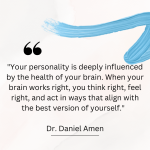
“If You Spot It, You Got It”: A Mirror for Self-Discovery
I remember the first time I heard the phrase, “If you spot it, you got it.” It stopped me in my tracks. The idea was so profound. If I called someone selfish, it meant I needed to turn the mirror right back on myself. That realization completely shifted how I viewed people and their behavior. It gave me a new sense of compassion and humility.
This simple phrase often comes up in self-help circles, personal development workshops, and even casual conversations about relationships. (My former husband jokingly calls me a professional workshop participant.) But what does it really mean? And how can such a short sentence hold the power to transform our self-awareness and personal growth?
Understanding the Concept
At its heart, “If you spot it, you got it” suggests that the traits we notice—and often judge—in others reflect something about ourselves. These might be qualities we’ve repressed, denied, or simply aren’t ready to acknowledge.
Think about it:
- If you’re quick to call someone selfish, could it be that you struggle with setting boundaries or have moments of self-centeredness you haven’t addressed?
- If you admire someone’s creativity or confidence, could it reflect untapped potential within you, waiting to be expressed?
This isn’t about blame or guilt. It’s about seeing human relationships for what they are: mirrors reflecting our inner world.
Why This Matters
Self-awareness is the cornerstone of personal growth. When we recognize that what we see in others often mirrors parts of ourselves, we gain the opportunity to:
- Break the Blame Cycle:
Instead of externalizing problems, we shift inward to examine our beliefs, behaviors, and biases. - Unlock Hidden Potential:
The positive traits we admire in others can serve as a roadmap to discovering our own strengths and aspirations. - Cultivate Compassion:
When we see our own struggles mirrored in others, judgment gives way to understanding.
The Shadow and the Light
Years ago, I was introduced to the concept of the “shadow self” through Debbie Ford’s book, The Shadow Effect. The shadow is the part of us we suppress or deny because it doesn’t align with our ideal self-image.
I’m reminded of a time when a friend and I were having dinner. We were enjoying an easy conversation when she suddenly started offering me advice. Her intentions were good, but I wasn’t expecting it and responded with a bit of sharpness. It reminded me of how, years ago, I often gave unsolicited advice myself—until I learned the importance of listening, waiting to be asked, and accepting people for who they are. Growth has taught me to avoid projecting my thoughts onto others and instead focus on understanding and connection. Later, my friend told me, “You really took my head off,” which gave me the opportunity to reflect on how I could have responded more gently.
A few years later, I found myself on an adventure with the same friend. This time, she was leading, and I asked if she’d like any feedback. She responded with a laugh, “Oh, that’s bad.” Her reaction made it clear she wasn’t ready for input, so I simply respected her space. That moment felt like a turning point—it reminded me how important it is to honor where someone is, whether they’re leading, listening, or just sharing their journey.
This experience taught me the value of recognizing and managing my own shadow while respecting others’ boundaries.
Carl Jung’s concept of the shadow ties beautifully into “If you spot it, you got it.” The traits we notice most strongly in others—whether they irritate or inspire us—often reside in this shadow:
- The negative traits (arrogance, anger, selfishness) might be aspects of ourselves we’ve hidden away.
- The positive traits (kindness, courage, creativity) could be qualities we haven’t fully embraced or expressed.
But it’s not all about shadows. This phrase also points to the “golden shadow”—the admiration we feel for others’ strengths that reflect the potential for greatness within ourselves.
Practical Ways to Apply This
- Pause and Reflect:
When someone sparks a strong reaction—positive or negative—ask yourself, “What does this say about me? Is there a part of me that feels this way or wants to express this?” - Journal Patterns:
Write down the recurring traits you notice in others. Explore how they might relate to your own life or experiences. - Seek Feedback:
Trusted friends or mentors can often help you connect the dots when you can’t see the mirror clearly. - Practice Self-Compassion:
If you uncover a trait you’re not proud of, remind yourself that awareness is the first step toward growth.
Moving from Judgment to Growth
The beauty of “If you spot it, you got it” lies in its ability to shift our perspective. Instead of seeing others as irritants or obstacles, we can view them as teachers. Every interaction becomes an invitation to learn something profound about ourselves and to grow into the person we’re meant to be.
So, the next time you find yourself reacting strongly to someone—whether with admiration or frustration—lean into it. Ask yourself, “What’s the lesson here?” Chances are, it’s an invitation to explore a part of yourself that’s waiting to be acknowledged, healed, or celebrated.
What we spot in others is often the key to unlocking something transformative within ourselves. And that’s where the journey of self-discovery truly begins.






